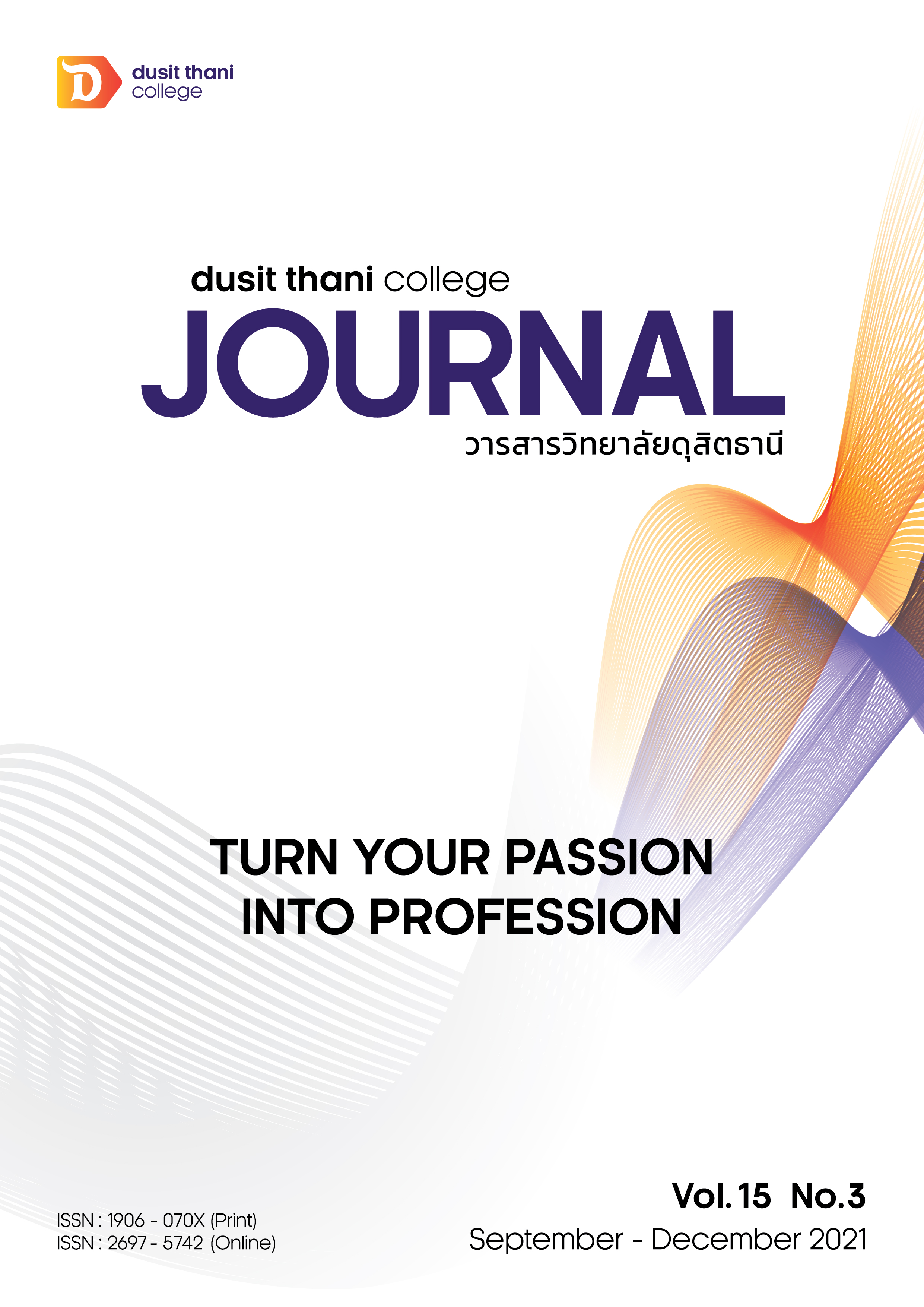A COMPARISON OF THE USE OF ENGLISH SKILLS IN PERFORMING TASKS OF HOTEL EMPLOYEES
Main Article Content
บทคัดย่อ
This study aims to 1) study the use of English in performing tasks of hotel employees, and 2) compare the use of English in performing tasks of hotel employees. The sample group of this study was 250 hotel employees in Thailand. The research instrument used in this research was collecting data from the sample group by using a simple random sampling method. The data were analyzed by using descriptive statistics. The results of the study the use of English in performing tasks of hotel employees, showed that English qualification is necessary in workplace (x̄ =4.06) which the conversation skills are considered the most necessary qualification (x̄ =4.44), followed by the telephoning (x̄ =4.24), and the business letter (x̄ =4.18) respectively. When compared the opportunity to use English in performing tasks among English major and non-English major graduates, the findings revealed that there was no significant difference in using English to perform tasks that were not related to conversation skills. Whereas the opportunity in performing communicative tasks that involves listening and speaking skills of English major and non-English major graduates was different with the statistical significance at the level of 0.05.
Article Details
นโยบายการพิจารณากลั่นกรองบทความ
- บทความวิจัยและบทความวิชาการทุกเรื่องที่จะได้รับการตีพิมพ์ต้องผ่านการพิจารณากลั่นกรองโดยผู้ทรงคุณวุฒิ (Peer Review) ในสาขาที่เกี่ยวข้อง จำนวน 3 ท่าน/บทความ
- บทความ ข้อความ ภาพประกอบและตารางประกอบที่ลงตีพิมพ์ในวารสารเป็นความคิดเห็นส่วนตัวของผู้เขียน กองบรรณาธิการไม่จำเป็นต้องเห็นด้วยเสมอไป และไม่มีส่วนรับผิดชอบใด ๆ ถือเป็นความรับผิดชอบของผู้เขียนแต่เพียงผู้เดียว
- บทความที่จะได้รับการตีพิมพ์จะต้องไม่เคยตีพิมพ์ เผยแพร่ที่ใดมาก่อน และไม่อยู่ระหว่างการพิจารณาของวารสารฉบับอื่น หากตรวจสอบพบว่ามีการตีพิมพ์ซ้ำซ้อน ถือเป็นความรับผิดชอบของผู้เขียนแต่เพียงผู้เดียว
- บทความใดที่ผู้อ่านเห็นว่าได้มีการลอกเลียนหรือแอบอ้างโดยปราศจากการอ้างอิง หรือทำให้เข้าใจผิดว่าเป็นผลงานของผู้เขียน กรุณาแจ้งให้กองบรรณาธิการวารสารทราบจะเป็นพระคุณยิ่ง
เอกสารอ้างอิง
Aksaranugraha, S (1997). The use of communication strategies to teach English. Bangkok: Chulalongkorn University.
Chaikiattidham, A. (2016). A Study of Basic English Used in Public Health by Personnel of Health in Promoting Hospitals MahaSarakham Province. Rajabhat MahaRasakham University Journal 10 (May-August 2016): 31-44.
Chareonwongsak, K. (2016). The New Future of Thai Education on Thailand 4.0. Retrieved May 23, 2017, from http://www.li.mahidol.ac.th/conference2016/
EF Education First. (2016). EF English Proficiency Index : EF EPI. Retrieved December 2, 2017, from https://www.theewf.org/uploads/pdf/ef-epi-2016-english.pdf.
Ellis, R. (2003). Task-based language learning and teaching. Oxford: Oxford University Press. English Vocabulary Knowledge and Reading Comprehension of Expanding Level Students. (Master’s Thesis, Chiangmai University).
Jareonsettasin, T. (2016). Education Reform & Entrance 4.0. Retrieved November 22, 2016,from http://www.chiangmainews.co.th/page/archives/540859.
Koul, L. (1984). Methodology Of Educational Research, Vani Education Book, New Delhi.
Kraichan, P. (2020). English Skill Development of the Employess in Hemaraj Rayong Industrial Land. Journal of Social Science and Buddhistic Anthropology. 5 (November 2020), 124-137.
Lurda, E. (2004). Non-native-speaker teachers and English as an International Language. International Journal of Applied Linguistics14/3: 314-323.
Pandamrongsathit, S. (2019). The Needs of English Using for Staff in Hotel Business Enterprises, Pathumthani Province. Pathumthani University Academic Journal, 5 (1), 29-38.
Piriyasilpa, Y. (2015). English Language Needs of Tourism Industries in Khon Kaen Province. Journal of Thai Hospitality & Tourism, 9, 2, 16-30.
Pitsuwan, S. (2017). Critique of Globalization. Retrieved November 2, 2017, from https://thaipublica.org/2017/08/surin-pitsuwan-itd-19-7-2560/.
Prommated, P. (2006). Use of Lexically Based Language Teaching to Enhance English Vocabulary Knowledge and Reading Comprehension of Expanding Level Students. Master’s Thesis, Chiangmai University.
Promwatcharanon, K., & Chatreepinyo, P. (2018). An Analysis of Challenges and Requirements of Using Communicative English for Developing a Self-Access Learning Package for Traffic Police Officers in Upper Northern Thailand. Humanities & Social Sciences 5 (1),166-195.
Rajan, B.R.S. (2001). Designing and teaching an ESP course for officials from the finance sector in Cambodia, Lao PDR and Vietnam. Proceeding of the English language teaching and learning at the tertiary level: From past to present and future trends. November, 29th- 30th 2001. Chulalongkorn University, Language Institute.
Rangsiborirak, K., & Kaeosawan, C. (2018). The Personnel Development in English Skill at Company A. Journal of Graduate School of Commerce-Burapha Review, 12(1), 73-82. Retrieved from https://so02.tcithaijo.org/index.php/GSC/article/view/94077.
Sriprasidh, I (2009). Thai Children are addicted to games because they cannot read English. Retrieved February 27, 2021, from ้http://www.saijai.net/frontEnd/newsHtml.jsp?id=reading.
Sriwanyoung, S. (2009). The Development of a Model for Promoting English Word Reading Skill for Dyslexic Students in Grade 2-3. Journal of Education,10-19.
Sujaree, T. (2008). Development of an English Reading Comprehension Instructional Model Through Scaffolding Reading Experience Strategies. Rajabhat Maha Sarakham University Journal, 4(3), 67-76.
Thaki, T. (2003). Management of the hotel. Bangkok: SE-ED.
Wanichanugorn, W. (2009). English for Tourism II. Bangkok: Chulalongkorn University Press.
Watcharaporn Paorohit. (2016). The Correlation between Motivation of English Development and Score ofEnglish Comprehension Level Examination of Air Force Student Nurses. EAU Heritage Journal Social Science and Humanities. Vol. 6 No. 3 (2016): 301-309.


